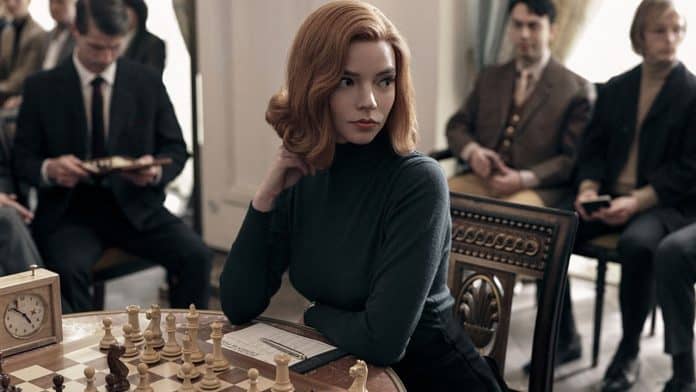From the writer of the excellent Logan (2017) and the awful Wolverine (2013), comes a limited series that falls somewhere in the middle. Scott Frank’s The Queen’s Gambit surely tries but never quite nails it.
Story
The Queen’s Gambit is based on a book by Walter Trevis by the same name and follows Beth Harmon (Isla Johnston then Anya Talyor-Joy), an unremarkable nine-year-old who falls in love with the game of chess while playing it with the janitor at her orphanage and discovers that she is, in fact, a genius.
The series follows the ups and downs in her life as she grows up to be a remarkable chess player. By the time she is 16, she is competing in the US Open. While dealing with sexism around her, she has to deal with her own demons from the past, fight addiction and the madness that often accompanies genius.
Performances
Anya Taylor Joy, quite simply, is excellent as Beth Harmon. She had already established herself as an actress to watch out for after her captivating performance in M Night Shyamalan’s Split (2017). In The Queen’s Gambit, she single-handedly saves the series.
Even though the character of Harmon is cold, isolated and stoic a lot of the times, Taylor-Joy is expressive. A lesser actor would have simply been blank or could have taken several cliched approaches to the same character but Taylor-Joy is, true to her name, is an absolute joy to watch. Scenes of her battles with addiction and the madness she inherited from her mother are especially mesmerising.
Marielle Heller, as Alma Wheatley, Harmon’s adoptive mother, is also exceptional. She is stuck in a bad marriage and wishes things went different in her life. She serves as a reminder to Harmon as to what her fate could be. She is a troubled woman with her own vices who Heller plays with such finesse that we always understand her perspective even though we don’t agree with her.
Benny Watts played by Thomas Broadie-Sangster is another chess prodigy who is currently the US chess champion. Initially, Sangster does not quite suit the role of Benny. He seems like a boyish arrogant brat who is quirky just for the sake of it. The casting of Sangster, who is mostly known for his roles as a teenager in many films, especially seems like a misfit. It’s only towards the end of the series that he feels bearable.
Harry Melling, as Harry Beltik, plays another chess prodigy. Melling, who is most well known for his role as Dudley Dursely in the Harry Potter films, is surprisingly excellent. He is given a lot to work with as his character is one of the few that changes a lot of the course of the series.
The rest of the cast is quite average primarily because they don’t seem to be working with a lot.
Positives
The production design of The Queen’s Gambit transports you to the 1950s and 60s where the story is set. All the sets and locations make the cold war era look quite aesthetic.
The cinematography by Steven Meizler is firm and solid. He does not try extravagant things but the scenes he has shot convey the emotion perfectly and complements the production design.
Garry Kasparov, Russian Grandmaster and former World Chess Champion, consulted on the series. As a result, it is one of the most accurate representations of chess on screen. In fact, each episode is named after a chess term. The title itself – The Queen’s Gambit is an opening move in chess.
The chess matches are thrilling and shot in such a way that even people who do not understand chess can make out what is going on and get more interested in the game. Such dedication to the accuracy while maintaining the thrill of the actual game is rarely seen on screen.
Negatives
The writing and direction by Scott Frank are painfully mediocre. He makes the most obvious choices and executes them in routine ways. The dialogue of the show is so predictable that one can almost guess the exact lines the characters are about to say before they utter a word.
The Queen’s Gambit is thematically muddled and all over the place. The series tries to tell several stories at once; a woman in a male-dominated field, a genius losing her mind, a tale of addiction, an orphan coming to terms with her past. But all these stories fall flat as none of them gets the focus they deserve. This results in a series that does not know what it is or what it wants to say. The drab direction and acting do not help.
Each episode also has one too many montages. They seem unnecessary and a convenient and lazy way to move the story along.
The penultimate episode is probably the best of the bunch. The series could have ended on a high but unfortunately, the final episode is not able to stick the landing as it resorts to overzealous cliches.
Worth It?
It’s a shame that a show about a game as cerebral and creative as chess is marred by cliches. If one doesn’t mind the bland storytelling, The Queen’s Gambit is a must-watch for Anya Taylor-Joy’s excellent performance and the enthralling chess matches.
Also read: Mirzapur season 2 review: Predictable yet engaging revenge saga

